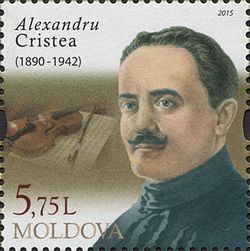
Alexandru Cristea (1890–1942) was a Romanian choir director, composer, and music teacher who was the composer of the music for “Limba Noastră,” which is the current national anthem of Moldova. Born in 1890, Cristea was the master of vocal music from Chişinău (1920–1940). In 1920, he was ordained as a deacon of the St. George Church in Chişinău. From 1927 to 1941 was a deacon of the Metropolitan Cathedral of Chişinău. He also taught at the “Unirea” Conservatory (1927–1929) in Chişinău with Alexandru Antonovschi (canto) and at the “Vasile Kormilov” music school (1928) with Gavriil Afanasiu. Then he became professor of music and conductor of the choir in the boys’ gymnasium “Ion Heliade Rădulescu” in Bucureşti (1940–1941). Later, between 1941 and 1942, he directed the choir at the “Queen Mother Elena” high school from Chişinău.
Cristea’s main composition is considered the music for “Limba Noastră,” current national anthem of Moldova. In 1942, he provided a tune for the 1917 lyrics of the priest-poet Alexei Mateevici (1888–1917), written a month before his death. Mateevici contributed significantly to the national emancipation of Bessarabia. For this, Cristea was awarded the “Răsplata muncii pentru biserică.” Cristea died in 1942. “Limba noastră,” meaning “Our Language,” has been the national anthem of the Republic of Moldova since 1994; it was officially adopted on July 22, 1995. For a short period before that, the official anthem of the country was Deșteaptă-te, române!, which was also (and remains today as) the national anthem of Romania.
Uniquely among national anthems, the focus of “Limba noastră” is the national language, Romanian (also known as Moldovan). It calls for the people to revive the usage of their native language. The poem does not make a named reference to the language; it is only called poetically “our language.” “Limba noastră,” like “Deșteaptă-te, române!”, also makes reference to the awakening from the sleep of death: “a people suddenly awaken from the sleep of death” and “awaken, Romanian, from the sleep of death,” respectively. The original poem contains four stanzas of twelve verses each. For the anthem, the verses were selected and reorganized into five stanzas of four verses each.
My collection includes the following work by Alexandru Cristea:
Limba noastra (Moldova)